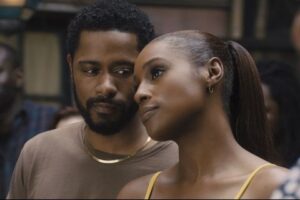
When we talk about “Black cinema” we must mention Black love on screen. As Black love stories reemerge, how are they redefining what “Black love” looks like?
There is something special about seeing Black love on the big screen. Most times, we are watching the pain and suffering of Black people of the past and present which is traumatizing — and exhausting — to watch. Our lives are more than the pain we experience but the love and resilience we have in building and shaping our relationships.
Some of the Black love stories of the 90s and early 2000s created a blueprint for what Black love looks like on screen. But the Black love stories of today redefine how we think of love in the new millennial.
Love on screen for Black women has rarely shown joy, patience or reassurance. Black women are usually shown suffering at the hands of abuse, physically and emotionally, before receiving the love they deserve. In movies like “The Photograph,” “Premature” and “Sylvie’s Love,” Black women can be the woman of their dreams while building a complex relationship.
Salamishah Tillet wrote an article describing Black women being ambitious to chase their own dreams outside of their male counterpart.
“Though they pay homage to Prince-Bythewood’s vision with African-American female leads as complex, cosmopolitan and curious as Monica, the central conflict of these new stories is whether their characters can work through personal trauma, break free of the ‘strong Black woman’ stereotype, and be vulnerable enough to love themselves and their partners.”
There are also stories that challenge Black masculinity. Movies like “Queen and Slim” and “If Beale Street Could Talk” show that Black men can be vulnerable and open with their female counterparts. There is a tenderness displayed on screen that gives them a humane presence from what audiences are used to seeing in Black men.
Terrence Weston, a pre-physical therapy major at Florida A&M, says the display of Black love on screen is more relatable.
“Now when I look at these movies, I can see myself or my emotions on screen,” Weston said. “It makes me feel like I’m heard and related to as a Black man who’s dating in this generation.”
It is truly a joy to see a film without the pain, suffering or abuse but infatuation, nurture, and growth of two individuals. The nuances of these stories are transversal to reality. Many of these new aged Black love stories will go down in the canon of the greatest love stories ever told.